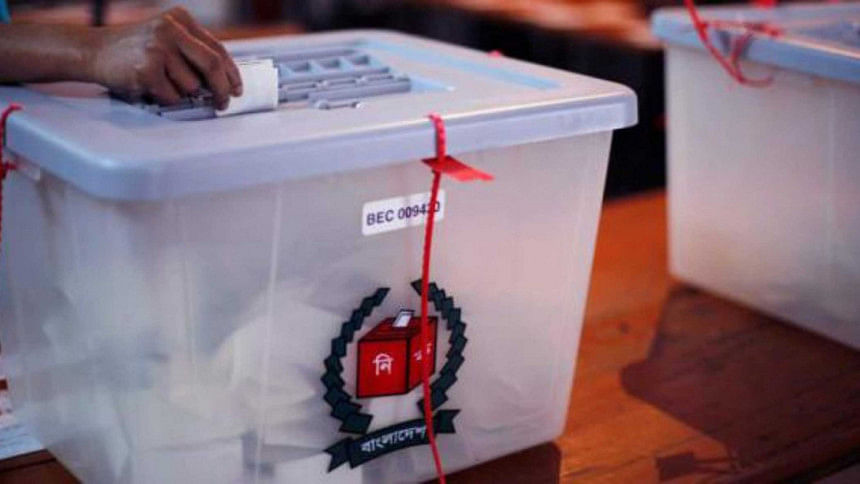Political divide deepening over polls timing

Bangladesh's political landscape is becoming increasingly polarised over the timing of the next election, with some parties aligning with the BNP to push for polls by December, while others are willing to wait until key reforms are implemented.
The BNP accuses the government of deliberate delay.
In a virtual address to a youth rally in Nayapaltan on Wednesday, its acting chairman Tarique Rahman said, "The national election must be held by December."
Framing the deadlock as a government tactic to cling to power, Tarique called the delay a betrayal of promised reforms and national unity.
His remarks drew sharp responses from across the political spectrum.
Around the same time, Chief Adviser Dr Muhammad Yunus, during his visit to Japan, said that only one party was demanding polls in December.
Though he had previously floated the idea of a December election, the interim government has since settled on a broader timeline, suggesting polls would be held anytime between December 2025 and June 2026.
For the BNP, that window is vague -- and far too distant.
Despite several high-level meetings between Yunus and the political parties, the government has not budged.
A spokesperson for the chief adviser recently reaffirmed June 2026 as the cut-off time for elections -- a response that has further entrenched political fault lines, especially as the BNP hardened its stance for a December election.
While some parties endorsed the BNP's call as timely, others -- particularly Islamist parties and newer entrants like the National Citizens Party (NCP) -- warned against rushing into elections without key reforms.
Biplobi Workers Party General Secretary Saiful Haque claimed most political parties want polls by December or even earlier.
Criticising the government for not clarifying the need for delay, he called Yunus's remarks in Japan "misleading" and warned of public agitation. "If the BNP and others take to the streets over election demands, it would be unfortunate for the government."
Some opposition voices argue the delay benefits the NCP, the party many see as closely tied to the government.
Bangladesh Jatiya Party Chairman Andaleeve Rahman Partha said Yunus had initially pointed to a December timeline. "If the government is genuinely focused on holding an election, then two of the current advisers should no longer remain in their posts."
Several parties have echoed this demand, raising concerns about bias and fears that the electoral process is being manipulated to engineer a favourable outcome.
Nagorik Oikya President Mahmudur Rahman Manna believes elections by December are possible. "If the government wishes, it can be done, which would be reasonable."
Reflecting on the interim government's performance so far, he said the expectations regarding reforms have not been met. "Even if the polls timeline is extended, it doesn't seem like much more will be achieved."
Gono Odhikar Parishad General Secretary Rashed Khan said polls must be held by December and warned the government's credibility would be at risk if the two advisers in question -- Information Adviser Mahfuj Alam and LGRD and Sports Adviser Asif Mahmud Sajeeb Bhuyain -- are not removed.
The NCP, on the other hand, alleged that by constantly pressing for the election, the BNP is "threatening" the government.
Its Chief Coordinator Nasiruddin Patwary yesterday said, "What the BNP is saying -- that the election must be held in December -- is a threat to the government.
"If the BNP tries to topple the government or something, things will escalate into a conflict."
Backing the chief adviser's timeline, Patwary said that without reforming constitutional institutions, any election would merely replace Sheikh Hasina with another party figurehead.
Meanwhile, Jamaat-e-Islami sticks to its preference for reforms and trial first and then polls.
Speaking at an event in Kishoreganj yesterday, its Nayeb-e-Ameer Mujibur Rahman said that while the people of Bangladesh want an election, they do not want one of "just any kind".
"We'll tell the government that justice must come first, then reforms, and only after that, the election can take place."
Downplaying the prospect of conflict, Jamaat's Assistant Secretary General Ahsanul Mahboob Zubair on Friday said, "There might be a difference of opinion regarding the polls' timeframe … But I don't think there would be any conflict … The issue will be settled through political wisdom and reality."
He added that once a proper election roadmap is unveiled, political disagreements would ease.
Islami Andolon Bangladesh, while critical of the government's "inefficiency", said the BNP's firm stance could amount to brinkmanship. Its Ameer, Syed Muhammad Rezaul Karim, said political forces were now split between "patriots and power-seekers".
"The patriots are demanding reforms, justice, and polls, while the power-seekers are only eager for a quick election," he told supporters at a rally in Bogra on Thursday.
"Even the Indians are showing interest in a quick election, and some parties in our country are eager for the same… We know the past of those crying for polls. Under their leadership, Bangladesh became champion in corruption. After the July uprising, that opportunity should not be given to anyone again."
He insisted the interim government must first deliver reforms and justice for the July killings. "If there's any negligence, we will protest. But repeatedly calling for an election and making the country unstable is meaningless."
The party's Secretary General Yunus Ahmed said, "We say that if necessary reforms are not implemented and the killers of July are not brought to justice, the election will not be free, fair, or meaningful … The BNP, from its partisan perspective, wants the election by December. But we support the chief adviser's timeline."
Some are advocating a middle ground. Bangladesh Khelafat Majlish's Mamunul Haque suggested an election by March 2026 -- allowing space for essential reforms while avoiding Ramadan and the monsoon.


 For all latest news, follow The Daily Star's Google News channel.
For all latest news, follow The Daily Star's Google News channel. 



Comments